In 2014, high-profile corporate voices on Twitter can be as casual, playful, and sometimes intimate as an individual user’s — and often more so. "~draw me like one of your French toasts~" the chain restaurant Denny's coos from its Twitter account, raking in thousands of faves and retweets. The tweet is funny, a kind of Twitter humor tour de force that remixes a relevant social-media meme with a comforting Denny’s menu item.
At the same time, upon reading perfectly casual and on-meme corporate tweets like these in my Twitter timeline, I've begun to feel discomfited. To be perfectly honest, I feel unsettled, even usurped or displaced, by corporations' perfectly on-point social-media voices.
To understand my unease, it’s necessary to trace back the trajectory of popular social-media voices to the time before corporations sounded like teens. Sounding like a teen when you’re not one isn’t new. When Twitter was first gathering steam around 2008 and 2009, I followed @hipsterrunoff, the Twitter account of a blogger named Carles who posted arch, deadpan musings—so flat in tone they felt infallibly ironic—on alternative American culture on his blog. The voice of Carles's Twitter account was something like that of a perpetually wry and mercurial teenager talking affectionately to his friends. "H8 U" he would say one minute, "<3 U" the next, as if exchanging texts. "Miss u".
Carles’s "real" identity was anonymous, and as such his voice could represent everyone's inner teen friend or teen self, roaming around mall establishments like Chili's and Hot Topic and dreaming of escaping to a relevant music #festival, an aimlessness amid our capitalist landscape with which Carles’s thousands of followers could identify. “Do u evr feel so empty that the only thing that can make u feel complete is the #Coachella lineup?” “Do u evr have those days where u want 2 quit life, drive a 2-door Civic, & become a substitute teacher who shows movies?"
Through Twitter you could feel like Carles was yours, hidden in your web browser or phone, making commentary about the anytown/job/suburb that you could believe — via the elastic proximity of social media — that you shared with him. Perpetually alienated and abbreviating and remixing words, he seemed firmly and comfortingly situated in subculture and not of the focus-group-tested, corporate mainstream that spoke to us on television and print.
A few years ago these distinctions were clear — only an imaginary teen on social media could tease us via text with his rapidly mutating tastes and emotions, while corporations still tried in stiff earnest to get us to buy whatever they were selling. Voice was the thing that told you who was who: casual insouciance signaled authenticity; perky seriousness was for brands worried about their bottom line.
But slowly, and by 2014, very quickly, the insouciant, lower-case voice became the mainstream, corporate voice. Now, a Denny’s tweet can sound more casual and on meme than any individual's Twitter account. And it isn’t just Denny’s: Brands from Chipotle to Hamburger Helper have gained massive followings this way. If in the past five years we all had to grow up somewhat — Carles doesn't even tweet anymore — how is it that corporations grew down, becoming the new meme-aware “teens” of social media?
It is a fact of marketing that brands can’t ask for business too directly. People tend to recoil from requests that feel too direct, and this is why social-media accounts explicitly selling anything seem like spam, triggering disinterest. Brands have to make us want them by giving us something: in branding terms, providing #value. This is how humor, or the gift of laughs, becomes the universal gift that any Twitter account can provide to its followers, as #weirdtwitter proved in its universe of thousands of anonymous accounts tweeting nonsensical humor at each other.
Seeing this humor as a universal formula for followers, corporate brands have steadily moved to the #weird #humor side of Twitter, in unison.
But if the conceit of #weirdtwitter is that any average person in America can remake themselves as a pseudonymous #weirdtwitter comedian, corporations joining the fray have an outsize advantage, because they are neither anonymous nor average nor even a person. When corporations tweet something “weird” and “funny” to us, we pay more attention: The thought of a traditional corporate entity, which has historically had no direct “voice,” suddenly distilling itself into an eccentric, devil-may-care character is instantly affecting, precisely because of how uncanny, even creepy, it is.
We all know that a corporation’s Twitter account is managed by a social-media worker (despite Denny’s claims on Twitter to be an “egg” rather than a social-media guru). Social media managers for corporate brands tend to be young people steeped in digital culture, who may be junior in status but are tasked with building a newly “hip” brand essence for the social media reading public. So does the frisson of reading these weird corporate tweets happen because we are rating the social-media manager’s performance on Twitter, like an Olympic judge holding up a score at the end of each tweet (and supplying important metrics to the brand at the same time)? Or does the Denny’s brand’s mewling Twitter intimacy make us feel paternal, bound to support and foster our corporate brand children as they speak to us through the web, learning our native medium?
That explanation doesn’t seem complete to me, though. I also feel a sinister intimation of power in these new corporate social-media voices. Denny’s the corporation has transformed itself through its tone into a hip, ageless kid basking in the approval of its many followers. And this may be the creepy core what makes me uncomfortable in the Denny’s voice: When brands speak anonymously and yet so intimately through the voices of unnamed social-media managers, we like them more than we can like any individual tweeter. On social media, the cute-voiced corporation is cuter than any person.
For us, there is a sociopathic freedom in knowing there is no individual behind the Twitter account. The corporation will not reach out for support in hard times the way an individual person on Twitter may. Laughing with it doesn’t trigger an existential fear that we might be relied on for support, sending vibes or crowdfunds during @dennysdiner’s darkest emotional hour.
But while our own motivations for liking corporate brands more than individual people on Twitter may signal a certain desire to shirk responsibility, the exploitative relation goes both ways. The corporation, while needing nothing emotional from us, still wants something: our attention, our loyalty, our love for its #brand, which it can by definition never return, either for us individually or for us as a class of persons. Corporations are not persons; they live above persons, with rights and profits superseding us. The most we can get from the brand is the minor personal branding thrill of retweeting a corporation’s particularly well-mixed on-meme tweet to show that we "get" both the meme and the corporation’s remix of it.
Is the sinisterness of the Denny’s Twitter presence, then, that even as we are laughing at a restaurant chain tweeting at us like a coy, meme-hashing kid, we are also aware that we are being manipulated by the witty teen's fundamental opposite? That no individual person could garner the laughs, followers, and, most important, shareholder value for being coolly funny that a corporation can? Because regular users can amass faves and followers, but not typically the shareholder value in their personal brand that a corporation can.
That is, in speaking to us like an equal, Denny's shows us how we can never be equals with a corporate brand, on Twitter as in life. In fact, just as corporations have become “persons” in law, they have also become “persons” on social media, bearing all the fruits of personhood while retaining all the massive advantages of being an entity that defies individual personhood. At the end of the day, @Dennysdiner is just a legal structuring entity housed somewhere in Delaware, formed to serve mediocre diner food in cities across America. And yet in spite of — or maybe even because of — this uncanny act of assuming personhood, we like it. Corporations can’t be lonely, but with their newfound “cute” voices they are becoming more popular than people.
To become popular and “cool,” brands have had to learn the very techniques we learned as resistant teens to deal with power: our sarcastic humor and our endlessly remixable memes. Corporate #weirdtwitter redeploys the memes we once used to signal our resistant identities to one other to make themselves seem like our sassy peers. In other words, Denny’s the corporation wants a seat at the table at the Denny’s where we used to go to meet and commune with other teens in all our midnight, underground, post-all-ages-show angst.
It isn’t enough for Denny’s to own the diners, it wants in on our alienation from power, capital, and adulthood too. While we giggle at corporate #weirdtwitter tweets, the corporate invulnerability that makes them easy to follow is also what makes their assumption of a human, familiar voice feel, despite our laughter and faves, cold and a bit pathological. Denny’s too wants to belong.
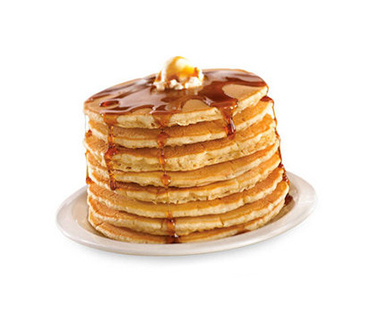
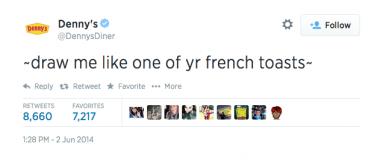
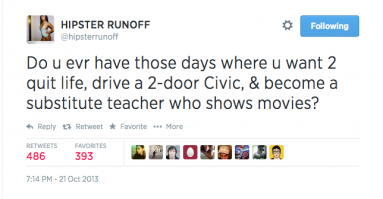
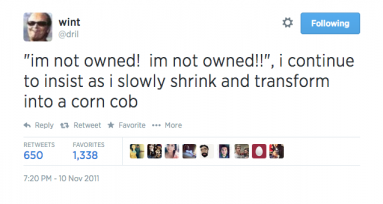
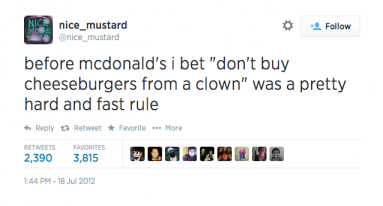
Comments are closed.